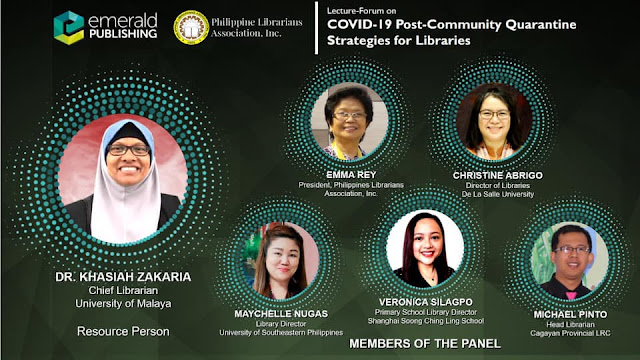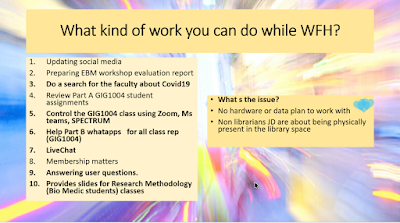Last April 27, 2020, Philippine Librarians Association, Inc. (PLAI) in partnership with Emerald Publishing held an online lecture forum on the topic of COVID-19 Post-Community Quarantine Strategies for Libraries. I think this is the first PLAI webinar streamed online. COVID-19 has changed our lives in a matter of a few weeks. All over the world, there are lockdowns, community quarantines, and other restrictions that make our usual social interactions impossible. Of course, this has also impacted libraries.
I think this is a good move by PLAI to conduct a lecture-forum online. It's good that librarians in different parts of the country and even outside can participate at no cost - you only need a good internet connection. As a librarian, I am also confused - what do we do now with this pandemic? This forum has been a great help, the featured speakers shared what they are doing to adjust in the midst of the pandemic. There were many useful ideas on what librarians can do now.
The webinar was timely, seamless, and well-organized. I used the Go to Webinar app on my phone to listen to the lecture. The organizer also issued a certificate of participation promptly, I received mine by e-mail two days after the online forum. I also like that they provided a link to the recording of the webinar which is useful and convenient for those who were not able to see it live. To see the recording, here is the link (registration required).
With the pandemic, online webinars like this might also be part of the so-called new normal. Our annual regional and national conferences might be put on hold due to the pandemic. There's a possibility that we might shift to an all-online approach when it comes to seminars, workshops, and conferences.
The main speaker for the webinar is Dr. Khasia Zakaria, Chief Librarian of the University of Malaya in Malaysia. She discussed how libraries all over the world responded to the pandemic and how libraries in Malaysia are doing. Many libraries shifted to online services and also provided information about COVID-19.
She shared what their university is doing with the pandemic. They are conducting online classes and getting the school community connected with social media. Their library is also offering online services such as online learning classes on information literacy, social media updates, and reference service via chat.
She emphasized that librarians should be wary of fake news and learn more about the pandemic. Their university set guidelines for work from home and also for libraries.
Emma Rey, current President of the Philippine Librarians Association, Inc. (PLAI) shared her response. According to her, in disasters and other emergency situations, human safety is still above library collections. The safety of librarians, library staff, and users are still the main priority. Practices such as social distancing, regular cleaning, and disinfection must continue. Safety equipment such as masks, gloves, and PPEs should be provided for librarians and staff.
She also discussed the best way to disinfect library materials: 'quarantine' or separate the books for at least 72 hours (3 days) before returning to the collection. Research shows that the virus stays on paper and cardboard for 24-72 hours, though it is still recommended to disinfect plastic surfaces. (Read more: Disinfecting Books and Other Collections)
Christine Abrigo, Director of Libraries of the De La Salle University in Manila shared how they planned for the lockdown even on short notice. Once the community quarantine was announced, they formed a short-term contingency plan for the library. According to her, social media was a big help in reaching out to the school community and support the students. Online renewal of borrowed books was encouraged.
They also conduct regular meetings and are setting their plans for re-opening the library. Their primary goal in re-opening is to not spread the virus and emphasize understanding the pandemic and the challenges it may bring. One of their proposed strategies is to set a budget for possible online services. They will also continue to monitor the pandemic situation and plan their response accordingly.
According to her, we need a change of mindset and "to rise to the occasion and be practical, as this situation will not adjust for us."
Maychelle Nugas, Library Director of the University of Southern Philippines also shared their practices. Working from home was encouraged, with the school providing pocket WiFis to their staff so they can connect to the internet. They also improved their online services and social media presence. For their work, a daily accomplishment report was required.
They provided links to their OPAC, databases, digital library, and guides to electronic resources. They also linked free online resources that students can access. They are also gathering information and resources on the COVID-19 pandemic from WHO, DOH, and local government units. Their school is discussing online learning and the library's capability to provide online services.
Veronica Silagpo, Primary School Library Director of a school in China, shared their strategies for re-opening the library. According to her, COVID-19 cases in China are decreasing and schools are gradually re-opening. For their library, they are limiting the number of students who can enter. The lending of books is also limited. Hand sanitation is encouraged. They utilize book drops for book returns. They also acquired a special UV lamp and book sterilizers to disinfect their materials.
Michael Pinto, Head Librarian of Cagayan Provincial Learning Resource Center and former PLAI President also shared his experience in the Public Library setting. Read more of his thoughts on the new normal in this article: Libraries after the Quarantine: the Next New Normal by Michael A. Pinto, RL
He shared possible changes that can happen in the 'new normal':
- Library work may be more focused on the outcome than hours worked.
- Sanitation or handwashing areas may be provided before entering the library.
- Social distancing may be a new challenge. For library staff, usual social interactions like eating lunch and snacks together will be limited.
- The physical layout of the library including offices and reading areas may be redesigned for social distancing.
- Book fairs may not be allowed
- As librarians, we can have a role in sharing valuable information to the public.
- More librarian, faculty, and student collaboration when it comes to online education
Online work and services will also be looked into. He suggested that libraries should improve online connectivity. Activities may also be held online such as storytelling and reference services. Hence, he emphasized setting up a website that is easy to navigate and constantly updated. If there is more focus on online services, library statistics and reports may change to monitor the library's online activity.
As for PLAI, Ms. Emma Rey also mentioned the relaxing of annual dues, more webinars for librarians, funds for librarians in need, trainings on disaster management and new skills for the new normal.
Overall, I am satisfied with the webinar, speakers, and topics discussed. This kind of webinar is a good way to bring speakers from different parts of the country or the world together to share their insights on this special situation. Libraries and librarians have no choice but to be flexible and adapt to the changes the 'new normal' will bring.













0 Comments